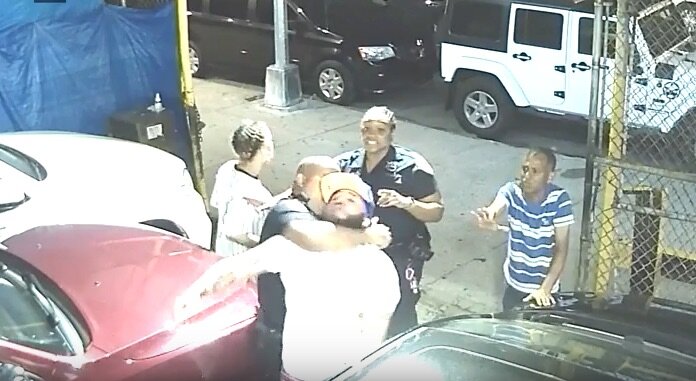NY State and Corrections Cops Claim They Have a Super Power to Use Chokeholds on Citizens in NYC that the Mayor (and the people) Can't Infringe Upon. PBA Seeks to Enjoin the New Strangulation Law
/NYC JULY 14, 2018. LEGAL SYSTEM BASED ON VIOLENCE AND PHYSICAL COERCION.
From [HERE] Following a similar suit by police unions, labor reps for state troopers and correctional officers sued Wednesday to overturn New York City’s ban on chokeholds. They say the ban criminalizes the maneuver even if no injury occurs, and that it encroaches on the authority of the state police superintendent. [more] In other words the NY PBA and NY Corrections officers believe they should have the power to use chokeholds on citizens so long as they don’t harm anyone and don’t have any criminal intent when are doing their strangulations.
The suit explains,
Section 10-181 criminalizes the use of any restraint that restricts the flow of air or blood "'by compressing the windpipe or the carotid arteries on each side of the neck, or sitting, kneeling, or standing on the chest or back in a manner that compresses the diaphragm, in the course of effecting or attempting to effect an arrest. " Section 10-181 is a strict liability penal statute which lacks any intent or other mental state requirement. In the same vein, criminal liability under the law attaches regardless of whether the prohibited conduct actually causes any injury. Criminal liability further attaches during the apprehension of an offender in New York City even if the criminal act occurred elsewhere in the State of New York.
Any violation of the statute's terms, even absent intent or resulting injury exposes Plaintiffs to prosecution as a misdemeanor which can result in imprisonment of up to a year.
Section 10-181 also threatens the plaintiffs with fines for doing their jobs in good faith with no intent to harm a suspect irrespective of whether a suspect even suffers injury. Section 10-181 thus goes far beyond a law governing police misconduct.”
It also states;
“Of equal importance is the fact that Section 10-181 directly impacts and conflicts with the ability of the Superintendent of State Police to make rules and regulations, subject to approval by the governor, for the discipline and control of the New York State Police. See N.Y. Exec. L. §215(3) Thus, state troopers operating trader the rules and regulations of the Superintendent, approved by the governor, are now subjected to different standards of policing and conduct than those promulgated by the Superintendent. Accordingly, preemption is warranted.”






































































































































































































































































